GUN TESTS GRADE: B-
$470
The Taurus 1911 Commander is finished in a simple, matte black with contrasting controls. The hammer, grip safety, thumb safety, slide release and magazine catch are all a polished black. Grips are of a checkered diamond pattern, made of polymer and attached with hex head screws. The barrel seems to be well fitted to the slide with no movement evident when the barrel hood is depressed. Both the front strap and mainspring housing are fine checkered in a pattern that is well executed though not particularly sharp. The magazine well is slightly beveled to aid in insertion. Both front and rear sights are black with white dots, mounted in dovetails and anchored by set screws. Wide, angled cocking serrations are present at the front and rear of the slide. The barrel is thicker than some we have seen, and the pistol uses a full-length recoil spring guide rod. Takedown is via normal procedure: Verify that the pistol is unloaded, check it again, use a bushing wrench to rotate the bushing clockwise, remove the recoil spring, rotate the bushing back all the way counter-clockwise and remove the bushing, line the slots up on the side of the slide and remove the slide release from right side to left, take off the slide and push out the barrel. The Commander is packed in a substantial case with two 9-round Mec-Gar magazines. Ten-rounders are readily available as aftermarket parts.
| Action Type | Semi auto, hammer fired, single action only |
| Overall Length | 7.8 in. |
| Overall Height | 5.5 in. |
| Maximum Width | 1.4 in. |
| Weight Unloaded | 35.8 oz. |
| Weight Loaded | 42.6 oz. w/10 rounds 124-gr. Hornady JHP |
| Slide Material | Carbon steel |
| Slide Retraction Effort | 18.9 oz. |
| Receiver Material | Carbon steel |
| Finish | Monochromatic black |
| Front Strap Height | 2.3 in. |
| Back Strap Height | 3.2 in. |
| Barrel Length | 4.25 in. |
| Grip Thickness (Maximum) | 1.2 in. |
| Grip Circumference | 5.4 in. |
| Magazine | Two 9-round |
| Rear Sight | Novak 2-dot in dovetail, windage adjustable, set screw |
| Front Sight | 1-dot in dovetail, set screw |
| Sight Radius | 5.6 in. |
| Trigger Pull Weight | 7.2 lbs. |
| Trigger Span | 2.6 in. |
| Safety | Firing pin drop, manual thumb safety, grip safety |
| Warranty | Limited lifetime |
| Telephone | (305) 624-1115 |
| Website | TaurusUSA.com |
| Made In | Brazil |
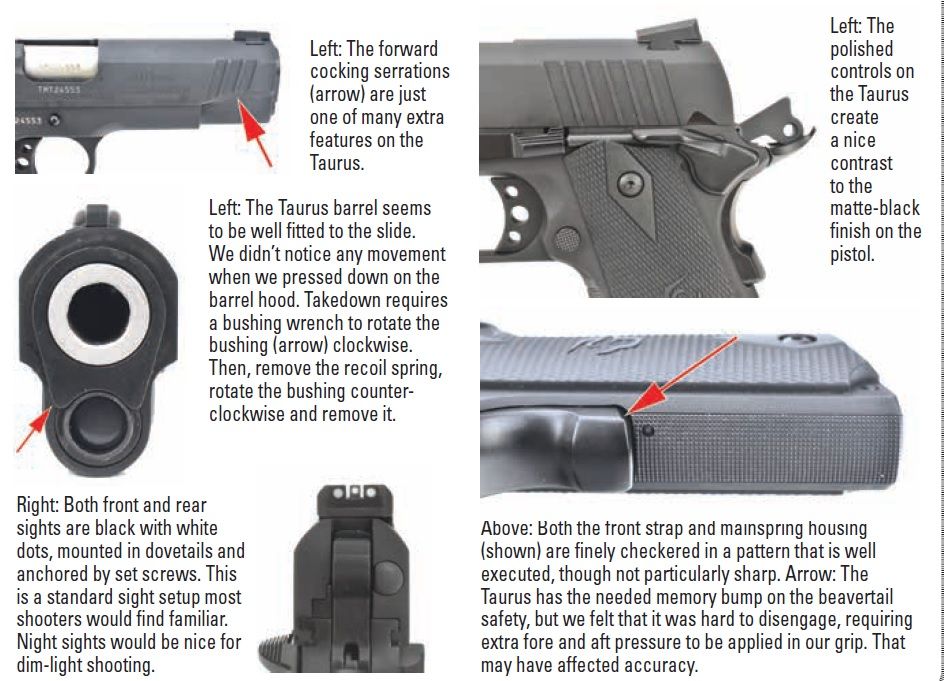 The basic 1911 design presents a superb fighting or target pistol that is slim for concealment’s sake, shoots an adequate to excellent cartridge for a pistol, and does so with the most “shootable” trigger on the market. Trigger compression can be light, crisp, and in a line straight to the rear. This same outstanding trigger can also create a couple of potential issues for the 1911 owner. First, the light, short movement aspect of the trigger virtually mandates a manual safety. This is provided on all 1911’s as a hinged lever, immediately forward of the hammer in a position easily activated by the right thumb. Ambidextrous models (with levers on both sides) are commonly available. Proper technique for the 1911 requires that the strong side thumb “live” on the safety whenever the pistol is on the hand. The only time the thumb is removed from the safety is to raise the lever into the safe position or manipulate the pistol, for example, to perform a reload or clear a malfunction. Second is the grip safety, which is a lever that has to be compressed on the back of the grip. If both safeties are not depressed simultaneously, a correctly functioning 1911 does not fire. This can be an issue for those with smaller or less-than-beefy hands. With the hand positioned high enough to properly disengage the thumb safety, the palm may not be able to correctly depress the grip safety and the pistol will not fire. The most commonly used cure for this has been to use a grip safety with a “memory pad” or extra-thick bump on the bottom of the grip safety. The palm engages this safety earlier in the gripping process, pushes the grip safety farther forward allowing the tab on the grip safety to raise earlier and the gun to fire when needed. The Taurus has the needed memory bump, but we felt that it was hard to disengage, requiring extra fore and aft pressure to be applied in our grip and, possibly, contributing to some of the large groups we witnessed from this pistol. Once again, this is an easy fix, but it is one that should be done by a competent gunsmith.
The basic 1911 design presents a superb fighting or target pistol that is slim for concealment’s sake, shoots an adequate to excellent cartridge for a pistol, and does so with the most “shootable” trigger on the market. Trigger compression can be light, crisp, and in a line straight to the rear. This same outstanding trigger can also create a couple of potential issues for the 1911 owner. First, the light, short movement aspect of the trigger virtually mandates a manual safety. This is provided on all 1911’s as a hinged lever, immediately forward of the hammer in a position easily activated by the right thumb. Ambidextrous models (with levers on both sides) are commonly available. Proper technique for the 1911 requires that the strong side thumb “live” on the safety whenever the pistol is on the hand. The only time the thumb is removed from the safety is to raise the lever into the safe position or manipulate the pistol, for example, to perform a reload or clear a malfunction. Second is the grip safety, which is a lever that has to be compressed on the back of the grip. If both safeties are not depressed simultaneously, a correctly functioning 1911 does not fire. This can be an issue for those with smaller or less-than-beefy hands. With the hand positioned high enough to properly disengage the thumb safety, the palm may not be able to correctly depress the grip safety and the pistol will not fire. The most commonly used cure for this has been to use a grip safety with a “memory pad” or extra-thick bump on the bottom of the grip safety. The palm engages this safety earlier in the gripping process, pushes the grip safety farther forward allowing the tab on the grip safety to raise earlier and the gun to fire when needed. The Taurus has the needed memory bump, but we felt that it was hard to disengage, requiring extra fore and aft pressure to be applied in our grip and, possibly, contributing to some of the large groups we witnessed from this pistol. Once again, this is an easy fix, but it is one that should be done by a competent gunsmith.
Our Team Said: The list of features is impressive, especially for a pistol in this price range. The somewhat poor accuracy surprised us.


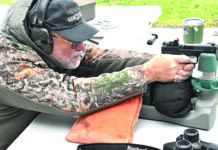
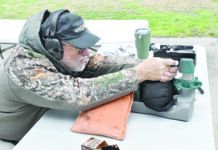
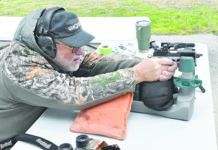
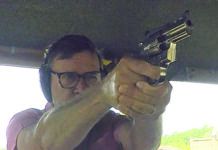
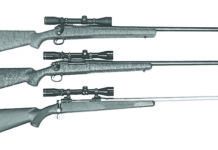
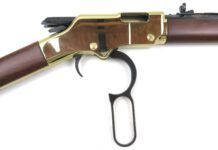
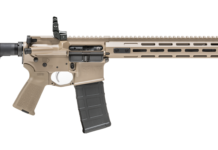
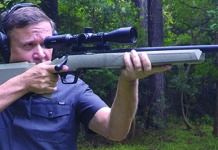
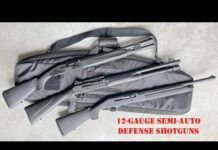


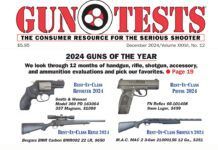

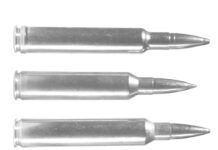

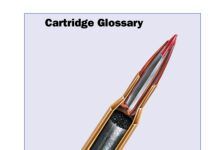
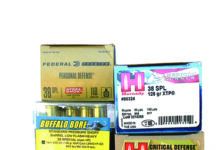
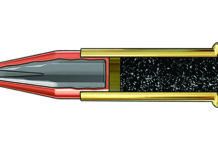
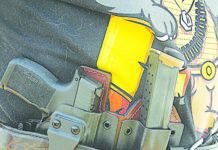






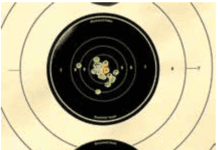
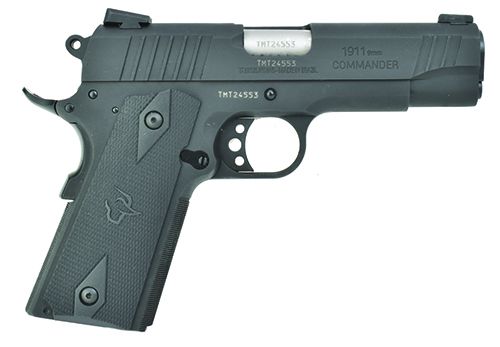

I had a hard time making my full size version of this 9MM Taurus hit where I aimed. Regardless of the remarkably low price, I was also taken aback by the rough, unfinished appearance of internal machining. Sold it and haven’t missed it.
Personally… I have had many dealing with returned Taurus Pistols… I would not have a Taurus taking up room in my safe. I found If it doesn’t bite you today, theirs always tomorrow.
I wonder how the Brazilian Army gets by with such dicey unreliable pistols? Mine works just fine. Never had a failure. It could be more accurate, but with all 1911s the more accurate, the tighter tolerances leads to unreliability…it’s plenty accurate for a defense pistol. Or take your target pistol to a gunfight..